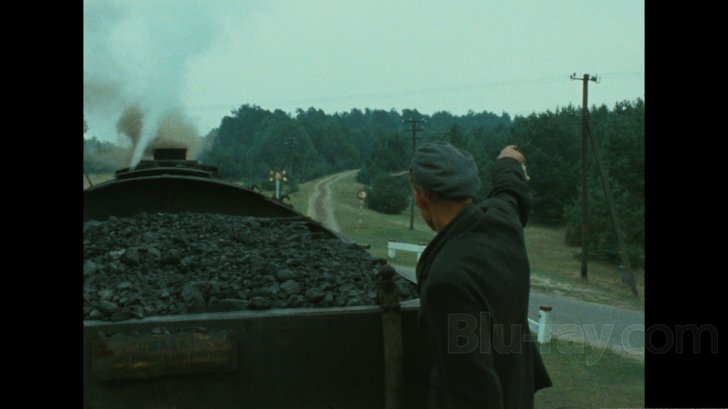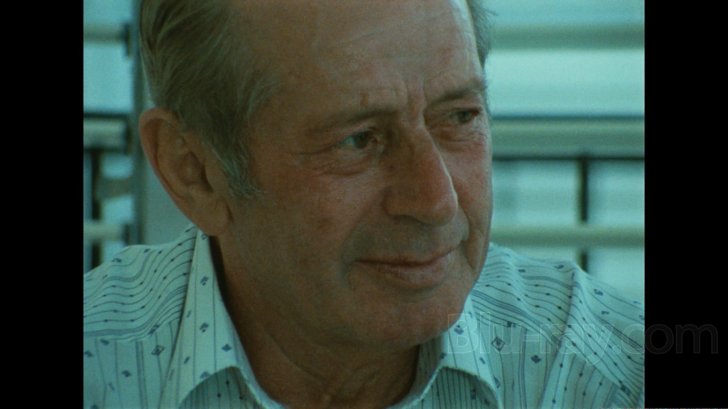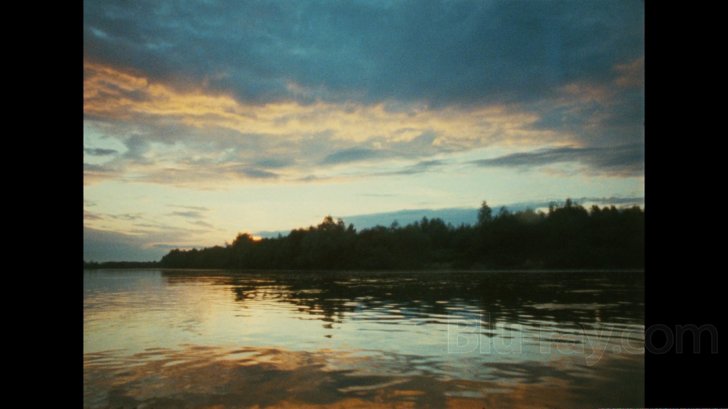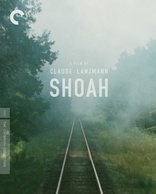Shoah Blu-ray Movie
HomeShoah Blu-ray Movie 
Criterion | 1985 | 568 min | Not rated | Jun 25, 2013Movie rating
8.7 | / 10 |
Blu-ray rating
| Users | 4.8 | |
| Reviewer | 4.0 | |
| Overall | 4.7 |
Overview
Shoah (1985)
Director Claude Lanzmann spent 11 years on this sprawling documentary about the Holocaust, conducting his own interviews and refusing to use a single frame of archival footage. Dividing Holocaust witnesses into three categories—survivors, bystanders, and perpetrators—Lanzmann presents testimonies from survivors of the Chełmno concentration camp, an Auschwitz escapee, and witnesses of the Warsaw Ghetto Uprising, as well as a chilling report of gas chambers from an SS officer at Treblinka.
Starring: Simon Srebnik, Michael Podchlebnik, Motke Zaďdl, Hanna Zaďdl, Jan PiwonskiDirector: Claude Lanzmann
| Foreign | Uncertain |
| Documentary | Uncertain |
| War | Uncertain |
| History | Uncertain |
Specifications
Video
Video codec: MPEG-4 AVC
Video resolution: 1080p
Aspect ratio: 1.37:1
Original aspect ratio: 1.37:1
Audio
French: LPCM Mono (48kHz, 24-bit)
Subtitles
English
Discs
50GB Blu-ray Disc
Three-disc set (3 BDs)
Playback
Region A (locked)
Review
Rating summary
| Movie | 4.0 | |
| Video | 5.0 | |
| Audio | 5.0 | |
| Extras | 5.0 | |
| Overall | 4.0 |
Shoah Blu-ray Movie Review
Reviewed by Dr. Svet Atanasov July 13, 2013Claude Lanzmann's "Shoah" (1985) arrives on Blu-ray courtesy of Criterion. The supplemental features on this release include a new video interview with the French director; new video interview with Caroline Shampetier and Arnaud Desplechin; Claude Lanzmann's documentaries "The Karski Report" and "Sobibor, October 14th, 1943, 4 P.M."; and more. The release also arrives with a 60-page illustrated booklet featuring film critic Kent Jones' essay "Approaching Shoah" and an essay by director Claude Lanzmann which originally appeared in the June 1979 issue of Les temps modernes. In French, with optional English subtitles for the main feature. Region-A "locked".

The camp was there...
The core of Claude Lanzmann’s Shoah (the Hebrew word for chaos/devastation) is comprised of various interviews with two groups of people. In the first group there are Holocaust survivors. They are elderly people living in different countries around the world. In the second group there are people that witnessed some of the most horrific crimes the Nazis committed during WWII. There are also people that helped other people commit these crimes.
The manner in which the interviews are conducted is simple. Accompanied by a translator, Lanzmann asks questions that encourage the people in front of his camera to remember. The interviews with the survivors are fascinating but frequently very difficult to watch. Some of the elderly men can barely talk – often the pain they feel while remembering is so overwhelming that some of them can only utter a few words before they begin crying; others simply remain silent.
Occasionally, Lanzmann’s encouraging words seem incredibly cruel. For example, early into the film he interviews Michael Podchlebnik, a survivor of the Chelmno camp, whose reactions confuse him – the man smiles while he recalls the crimes he witnessed years ago. Then, encouraged by Lanzmann, he explains why he smiled and how for years he struggled to forget the past and tears quickly fill up his eyes. In just a few minutes the man has become unrecognizable – his hands are shaking, his face looks pale, his voice trembles.
There are other long interviews with villagers in Poland, some of whom saw the Nazis transport Jewish prisoners to Treblinka. What they share in front of Lanzmann’s camera is just as disturbing. Apparently, in the beginning there were villagers that could not possibly imagine what the Nazis had planned. They saw the trains coming in but lived their lives as if nothing had changed. Then, after they began realizing what was underway, they were forced to continue living as if nothing had changed – and many did, but now many of them knew that people were routinely exterminated in the gas chambers. The villagers’ bizarre recollections belong to some of the most intense interviews in the entire film.
There are also interviews with people who were on the opposite side, people who knew very well that they were helping the killers. Arguably the most illumining one is with SS man Franz Suchomel, who agreed to do an audio interview but was secretly filmed by Lanzmann. He was at Treblinka when people started entering the gas chambers. His descriptions are dry, often quite uneven, incredibly disturbing.
The overwhelming majority of the material gathered by Lanzmann in this truly epic 566-minute film is undoubtedly of tremendous importance, but there are also many questions in it that should not have been asked. Lanzmann’s persistence to get the most out of the men and women in front of his camera frequently feels disrespectful, at times even borderline manipulative. There are some memories that do not belong in any film, regardless of how noble its intent might have been.
Ultimately, however, Shoah is a tremendously important film that should be seen by everyone. In the increasingly unstable world we live today, and with the horrors of Bosnia, Darfur and Rwanda still fresh in our minds, it is an indisputable fact that its message is still relevant.
Note: In 1986, Shoah won FIPRESCI Prize, OCIC Award - Honorable Mention Award, and Caligari Film Award at the Berlin International Film Festival.
Shoah Blu-ray Movie, Video Quality 

Presented in its original aspect ratio of 1.37:1, encoded with MPEG-4 AVC and granted a 1080p transfer, Claude Lanzmann's Shoah arrives on Blu-ray courtesy of Criterion.
The following text appears inside the booklet provided with this Blu-ray disc:
"This new digital master was produced from a restoration undertaken in 2012-13 by the Cineteca di Bologna in Italy. The transfer was created in 4K resolution on an ARRISCAN film scanner from the original 16mm camera negative at L'Immagine Ritrovata in Bologna. The restoration was then performed in 2K resolution at L'Immagine Ritrovata using Image Systems' Phoenix and DaVinci's Revival software, to address image stabilization, flicker, dirt, debris, and sparkle. Finally, the scans were color-corrected at Eclair Laboratories in Epinay-sur-Seine, France, under the supervision of Caroline Champetier, who served as assistant camera person on Shoah. During the process, using a 35mm print as a reference, Champetier regraded every shot, with a minimum of reframing and sharpening, and without masking.
The soundtrack was scanned at L'Immagine Ritrovata from the original 16mm negative soundtrack on a Chase Optical Sound Processor, preserving the monaural mix. Sound mixer Gerald Lamps supervised the minimal restoration of the soundtrack, which was performed for noise reduction and to address occasional dropouts.
4K scanning: Paola Ferrari.
Digital restoration supervisors: Diego Mercuriali, Celine Stephanie Pozzi, Marco Rossi.
Sound digitization and restoration: Gilles Barberis.
Color correction supervisor: Caroline Champetier.
Colorist: Raymond Terrentin/Eclair Laboratories, Epinay-sur-Seine, France.
Transfer supervisor: Phillipe Tourret/Eclair Laboratories, Epinay-sur-Seine, France."
The restoration has produced some truly marvelous results. Image depth and especially clarity are dramatically improved. Areas of the film that used to look quite flat and fuzzy on the R1 DVD release now boast substantially better clarity (screencapture #12 is from one such area). Despite the fact that the many interviews were also filmed under vastly different conditions, during close-ups image depth is now also consistently pleasing (see screencapture #2). Color saturation varies, but this should not be surprising considering how and when the footage used in the film was shot. There are also various stability corrections and enhancements that have been performed. Finally, dirt, scratches, and debris have been completely removed. To sum it all up, the current presentation of Shoah is very clearly optimized as best as possible. Naturally, I believe that it will remain the definitive presentation of this very important film for years to come. (Note: This is a Region-A "locked" Blu-ray release. Therefore, you must have a native Region-A or Region-Free PS3 or SA in order to access its content).
Shoah Blu-ray Movie, Audio Quality 

There is only one standard audio track on this Blu-ray release: French LPCM 1.0 (with portions of Italian, Hebrew, English, Polish, and German). For the record, Criterion have provided optional English subtitles for the main feature.
The one very obvious difference between the lossy track from the DVD release and this new lossless track is the fact that additional noise has been removed. Overall stability is also improved. Unsurprisingly, there are still some depth fluctuations, but overall the dialog is far better balanced. It is also cleaner. The English translation is excellent.
Shoah Blu-ray Movie, Special Features and Extras 

- A Visitor from the Living - in this documentary, Maurice Rossel, leader discusses the living conditions in Theresienstadt, a town approximately fifty miles outside of Prague which was chosen by the Nazis to be a "model ghetto/a ghetto to be shown". From here, eventually many Jews were sent to the gas chambers of Treblinka, Sobibor, amd Belzec. Mr. Rossel visited Theresienstadt as a leader of the International Committee of the Red Cross (ICRC) in June 1944. The interview was conducted by Claude Lanzmann in 1979 while shooting Shoah. In French, with optional English subtitles. (68 min, 1080i).
- Sobibor, October 14th, 1943, 4 P.M. - while shooting Shoah, Claude Lanzmann interviewed Yehuda Lerner, who participated in the uprising at the Sobibor concentration camp in 1943. The long interview, which was conducted in 1979, plus additional footage was used by the French director to create this documentary film. In French and Hebrew, with optional English subtitles. (103 min, 1080i).
- The Karski Report - in this documentary from 2010, Polish underground member Jan Karski recalls his encounter with President Roosevelt and discusses its significance. Mr. Karski was a courier between the domestic Polish resistance and the Polish government exiled in London who visited the Polish ghetto and met various Polish Jewish leaders prior to meeting President Roosevelt. The interview with Mr. Karski was conducted by Claude Lanzmann in Washington in 1978. Portions of it are included in Shoah. In English, with optional English subtitles. (49 min, 1080i).
- Claude Lanzmann Interviews -
1. On Shoah - in this new video interview, director Claude Lanzmann discusses the production history of Shoah with Serge Toubiana, director of the Cinematheque francaise. The conversation was filmed exclusively for Criterion in Paris in January 2013. (61 min, 1080p).
2. 2003 Interview - in this video interview, director Claude Lanzmann explains how A Visitor from the Living and Sobibor, October 14, 1943, 4 P.M. came to exist. Also present is writer Helene Frappat. In French, with optional English subtitles. (14 min, 1080i).
- Caroline Champetier and Arnaud Desplechin - in this video interview, Caroline Shampetier, who did assistant camera work on Shoah and supervised the color timing of the new restoration, and director Arnaud Desplechin (A Christmas Tale, Kings & Queen) discuss Claude Lanzmann's film, its structure and history. The interview was conducted in Paris in January 2013. In French, with optional English subtitles. (34 min), 1080p).
- Booklet - 60-page illustrated booklet featuring film critic Kent Jones' essay "Approaching Shoah" and an essay by director Claude Lanzmann which originally appeared in the June 1979 issue of Les temps modernes.
- Trailer - original trailer for Shoah. (5 min, 1080i).
Shoah Blu-ray Movie, Overall Score and Recommendation 

The material gathered by director Claude Lanzmann in his 566-minute film Shoah is undoubtedly of tremendous importance, but this isn't a film that is easy to recommend. It is very difficult to watch - there is too much real pain in it, too much sorrow. I personally think that there are also questions in the film that should have never been asked out of respect for those who agreed to be part of it. Criterion's Blu-ray release of Shoah is likely to remain the film's definitive presentation for years. RENT IT first.
Similar titles
Similar titles you might also like

The Last of the Unjust
Le dernier des injustes
2013

The Sorrow and the Pity
Le chagrin et la pitié
1969

The World at War
1973

Apocalypse: World War II
2010

Night and Fog
Nuit et brouillard
1956

In the Fog
V tumane
2012

City of Life and Death
南京!南京! / Nanjing! Nanjing!
2009

Army of Shadows
L'armée des ombres / Better encode than 2011 release
1969

Faces Places
Visages villages
2017

The Battle of Algiers
La battaglia di Algeri
1966

Henri-Georges Clouzot's Inferno
L'Enfer d'Henri-Georges Clouzot
2009

The Painted Bird
Nabarvené ptáce / Slipcover in Original Pressing
2019

Black Rain
Kuroi ame
1989

The Act of Killing
2012

Come and See
Иди и смотри / Idi i smotri
1985

The Emperor's Naked Army Marches On
ゆきゆきて、神軍 / Yuki yukite, shingun
1987

Three Songs About Lenin
Три песни о Ленине / Tri pesni o Lenine
1934

Chronicle of a Summer
Chronique d'un été
1961

Land of Mine
Under Sandet
2015

Stalingrad
1993
